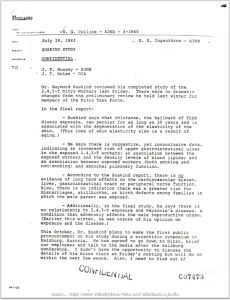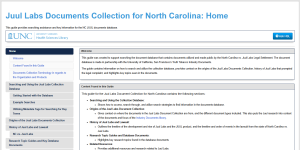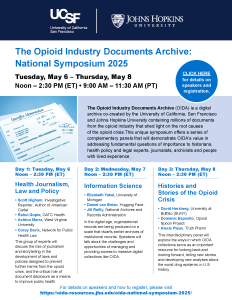
Collections
 @industrydocs on Twitter
@industrydocs on Twitter
IDL released the first tranche from its newest collection, the Endo Documents. This first batch includes over 100,000 documents; the collection will be OIDA's largest yet, encompassing close to 3.8 million documents when complete.
Endo, a pharmaceutical company based near Philadelphia, sold billions of opioid pills over two decades, including oxycodone/acetaminophen (Percocet) and oxymorphone hydrochloride extended-release (Opana ER). In 2013, it acquired Par Pharmaceuticals, a manufacturer of generic opioids.
Endo faced thousands of lawsuits from state and local governments, Native American tribes, and individuals who accused the company of fueling the opioid crisis by misrepresenting the safety of its drugs. In February 2024, the U.S. Department of Justice announced a global settlement resolving both criminal and civil investigations into Endo, allowing the company to proceed with bankruptcy. As part of the resolution, Endo admitted that from April 2012 to May 2013, some of its sales representatives falsely promoted Opana ER as abuse-deterrent, despite a lack of clinical evidence. The settlement also addressed allegations that between 2011 and 2017, Endo marketed Opana for unapproved uses and failed to act on clear signs of doctor overprescribing and drug diversion.
This month, IDL staff added over 177,000 documents produced by the Settling States in the multistate litigation against Juul Labs. With this batch, the Juul Labs Collection has reached the 4 million document mark! When complete, the Juul Labs collection will contain approximately 7 million documents.
IDL is working through the files as quickly as possible and will post new documents every month.
We are excited to announce that the UCSF Industry Documents Library will be launching a new version of our website next month with a fresh look and feel! This new website will offer a more user-friendly experience with advanced search capabilities, improved content organization, and enhanced readability and accessibility.
New and Improved Website Features:
The IDL team received the Silver Award in Design at the 2025 UC Tech Awards! The University of California recognized outstanding contributions across the system, and we’re proud to be honored for our work redesigning and rebuilding the UCSF Industry Documents Library website. Stay tuned in August for the launch of our redesigned site!
Ruth Tabancay is the UCSF Library's 2024 Artist in Residence. At a well attended opening reception last month, Ruth introduced her exhibit, “Fossil Fuels: How Humans Commodified a Natural Resource” on the main floor of the Kalmanovitz Library and showcased her artwork.
As the UCSF Library Artist in Residence, Ruth continued her research into the adverse effects of global warming and plastic accumulation on the planet. She used the Fossil Fuel and the Chemical Collections in the Industry Documents Library to find early communications within those industries, responses to government regulations, and how these industries presented themselves to their stockholders and the public. Ruth also investigated the Archives and Special Collections' health sciences artifacts to reveal new ways in which she thinks about tools and their connections to public health and her art.
The artwork for the final exhibition incorporated plastic discarded at UCSF from various departments and locations to highlight the contributions that medical centers make to the growing mass of plastic waste.
We hope this showcase of how scholars, students, journalists, policymakers, advocates and others are using OIDA resources will inspire future work.
Gaurab Bhardwaj, Associate Professor of Management, Babson College
How do you use OIDA in your teaching, research, or advocacy? The archive and publications based on it have been invaluable for my own learning about the opioid epidemic. It led me to design a decision-making exercise to encourage my students to consider the ethical dimensions of business decisions. Because the role of companies in the opioid epidemic is now well known, I disguise the drug and company names to prevent preconceived ideas and biases. I have them look at clinical data and ask whether they would commercialize the drug and why. Many say yes, some say no. We discuss everyone's reasoning. We go through another decision or two. Then, I reveal that the company is Purdue Pharma and the drug is OxyContin. Without the benefit of hindsight, students develop a better appreciation for how business decisions can be detached from ethical considerations and lead to disastrous consequences later. It is one thing to learn how someone else in the past made unethical decisions and conclude that you would never do it. It is quite sobering to discover that you might make the same decision when driven by corporate goals and omitting the ethical dimensions.
What advice would you give to people new to OIDA? In addition to following the research guidelines and tools available on the website, I have particularly enjoyed the “featured” function on the homepage that showcases documents randomly. The unexpected nature of it appeals to my sense of discovery and serendipity. It makes my own learning fun, and it often leads me to information I would not have known to seek.
We hope this showcase of how scholars, students, journalists, policymakers, advocates and others are using OIDA resources will inspire future work.
Daniel Eisenkraft Klein, Postdoctoral Fellow, Program on Regulation, Therapeutics, And Law, Brigham and Women’s Hospital, Harvard Medical School
How do you use OIDA in your teaching, research, or advocacy? I view the Opioid Industry Documents Archive (OIDA) as an unparalleled resource for understanding how corporate strategies helped to drive the overdose crisis. My team and I used OIDA documents to examine how Mallinckrodt Pharmaceuticals deployed incentive structures, sales contests, and rhetorical strategies as part of “Operation Change Agent,” a campaign to shift prescribers from OxyContin to its own opioid products. I’ve also used OIDA in my teaching to anchor discussions of the commercial determinants of health in real-world documents, helping students to move past theory and see how these strategies play out in practice.
What advice would you give to people new to OIDA?
Don’t assume all the major stories have already been told. We’ve previously written about the many untapped possibilities for future research with the Archive, but those examples are just the tip of the iceberg. For instance, much more attention is needed on how the industry has sought to expand internationally by lobbying for the deregulation of opioids abroad. These types of studies will offer important insights into how industry strategies have contributed to unequal patterns of opioid-related harms around the world.
Also – don’t hesitate to reach out for assistance from the amazing archivists and librarians! They’re incredible partners for this kind of work.
As a Canadian, I view OIDA as a powerful template for what meaningful document disclosure can and should look like in future settlements – including our own – to ensure that corporate accountability is paired with public access to the truth.
A small set of 22 documents has been added to the Juul Labs Collection, under the State of Washington sub-collection. These documents were released as part of the 2020 lawsuit State of Washington vs. Juul Labs, Inc, et al. They relate to Juul company Pax Labs' efforts to obtain a license to distribute and sell vapor products in Washington State.
Our very own UCSF IDL Director, Kate Tasker, will be joined by Tracey Woodruff and Nicholas Chartres of the new Center to End Corporate Harm in a webinar hosted by the Collaborative for Health & Environment. Thursday, May 29 at 12pm PT/3pm ET
For more information and to register:
https://www.healthandenvironment.org/che-webinars/96994
Center director Dr. Tracey Woodruff will introduce the concept of “commercial determinants of health,” and outline the Center’s purpose and plans. Industry Documents Library Director Kate Tasker will provide an overview of the Industry Documents Library and how to use it — the documents are fully searchable and accessible to the public. And Dr. Nicholas Chartres, lead scientific advisor to the new Center, will provide examples of the mechanisms and strategies these corporations use to proliferate the sale of their products using published case studies. CHE Director Kristin Schafer will moderate the session.
If you are unable to make the webinar, a recording will be made available soon.
Thank you to all who participated in our second OIDA National Symposium, held online May 6-8, 2025!
Recordings are now available on YouTube and on the symposium website.
Chapter markers in each video make it possible to navigate directly to specific presentations. These are linked within the agenda on the symposium website for ease of access.
We are excited to announce the addition of the Poison Papers, a collection of approximately 4,700 documents gathered primarily by Carol Van Strum during her battles with Dow, Monsanto, the Environmental Protection Agency (EPA), National Forestry Service, and others over PCBs, dioxin, and the aerial spraying of herbicide 2,4,5-T in the Oregon forest where she lived.
The chemical dioxin, a serious pollutant of chemical and pulp and paper manufacturing, was a contaminant in Agent Orange, which the U.S. military sprayed in Vietnam and was linked to serious health problems, including birth defects.
Read the full announcement on the UCSF Program on Reproductive Health and the Environment (PRHE) blog.
UCSF PRHE and the Bioscience Resource Project facilitated the donation of this collection and the UCSF Library Access Services Team provided the indexing of the documents. Thank you so much for helping to make these materials available to the public!

We added over 220,000 documents to the Teva and Allergan Documents. This batch brings the collection to more than 1.9 million documents and includes training materials, marketing communications, and more. With this batch, OIDA reached the 5 million documents milestone!
The Teva and Allergan collection will encompass about 2 million documents when complete. Processed documents are being made public on a rolling basis with monthly releases expected through 2025.
This month, IDL staff added over 189,000 documents produced by the Settling States in the multistate litigation against Juul Labs. When complete, the Juul Labs collection will contain approximately 7 million documents. IDL is working through the files as quickly as possible and will post new documents every month.
North Carolina Juul Labs Collection
5,940 new files have been added to the Juul Labs Collection under the State of North Carolina sub-collection. These materials represent the final batches to be processed from the North Carolina settlement agreement.
Included in this final batch of documents are 480 ZIP files that were previously an archival processing challenge due to the loss of the original compressed file structure during the e-discovery process. The IDL team was wrangling with approximately 300,000 discrete records that did not make sense without the greater context of their original ZIP wrapper and sibling records. We reconstructed these original files, collapsing 300,000 documents into 480 ZIP files. We hope this work increases context and research value to these groups of files as these records often contain marketing designs or scientific product testing data.

UNC Libraries has created a comprehensive research guide to help you navigate the Juul Labs documents from the North Carolina settlement. This guide provides insight into the origins of the Juul Collection, covering the history of Juul Labs, the NC litigation, and key themes found in the documents. Whether you're researching industry practices, public health impacts, or legal actions, this resource is full of information to get you started.
Join us for our second annual Opioid Industry Documents Archive National Symposium, to be held online May 6 - May 8, noon-2:30 pm (ET) / 9-11:30 am (PT).
For details on speakers and to register, visit: https://oida-resources.jhu.edu/oida-events/oida-national-symposium-2025/.

Introducing a new series in our blog and emails, OIDA Researchers Share! We hope this showcase of how scholars, students, journalists, policymakers, advocates and others are using OIDA resources will inspire future work.
Maud Bernisson, postdoctoral fellow at LISIS (Laboratoire Interdisciplinaire Sciences Innovations Sociétés), CNRS (Centre national de la recherche scientifique), Université Gustave Eiffel (Paris, France)
How do you use OIDA in your teaching, research, or advocacy? In terms of research, I find the OIDA an invaluable resource. The diversity and massive amount of documents in the OIDA have been particularly helpful for me to develop different approaches to examine publication planning in detail. For example, with colleagues, we have found documents like contracts and publications to study how a pharmaceutical company like Mallinckrodt implement publication planning. The OIDA has also helped me to identify types of documents needed for publication planning, like publication guidelines, that I could then gather from other sources as well to further study the ethics of publication planning. The OIDA is thus an essential resource to research this topic.
What advice would you give to people new to OIDA? In my experience, using serendipity to dive into the database helped to learn about the opioid manufacturers, their internal organisation and communications. It also helped find unexpected information, like contracts or drafts of publications. Serendipity is however not always a viable option since it requires time. For users who cannot afford it, I would advise them to start by reading the documentation provided by the OIDA and learn about the role of these companies in the opioid crisis, and what has already been documented thanks to this database. The advantages of the OIDA are not only the massive amount of data and the available documentation but also its structure and the search criteria available. The database indeed permits users to explore the bowels of several companies, which includes its internal organisation, communications, and work topics. This information provides a context essential to then focus on a specific inquiry.
The Opioid Industry Documents Archive (OIDA) is hosting a national symposium, Tuesday, May 6 through Thursday, May 8, noon-2:30 PM (ET) / 9:00 AM-11:30 AM (PT). This unique virtual symposium offers a series of complementary panels that demonstrates OIDA’s value in addressing fundamental questions of importance to historians, health policy and legal experts, journalists, archivists and people with lived experience.
Dates: Tuesday, May 6 through Thursday, May 8 – each day noon to 2:30 PM ET (9:00 AM-11:30 AM PT)
Day 1: Health Journalism, Law and Policy (Tuesday, May 6) This group of experts will discuss the role of journalism and storytelling in the development of laws and policies designed to prevent further harms from the opioid crisis, and the critical role of document disclosure as a means to improve public health.
Day 2: Information Science (Wednesday, May 7) In the digital age, organizational records are being produced on a scale that dwarfs earlier archives of institutional records. Speakers will talk about the challenges and opportunities of managing and providing access to massive digital collections like OIDA.
Day 3: Histories and Stories of the Opioid Crisis (Thursday, May 8) This interdisciplinary panel will explore the ways in which OIDA collections serve as an important resource for looking back and looking forward, telling new stories and developing new analyses about the worst drug epidemic in U.S. history.
For more details on speakers and how to register, please visit https://oida-resources.jhu.edu/oida-national-symposium-2025/.